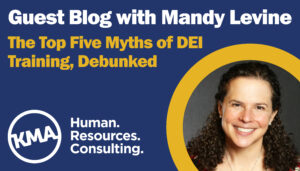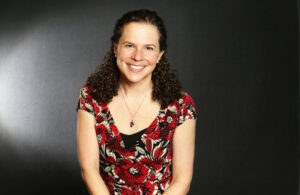Guest blog by Mandy Levine, of Mandy Levine Consulting
 Over the past few years, there has been a proliferation of diversity, equity, and inclusion (“DEI”) trainings being rolled out at organizations throughout the country. As someone whose livelihood is significantly devoted to facilitating these workshops, I am tremendously grateful for this increased demand for such services. I also realize that many participants come to DEI classes with concerns and even sometimes hostility. Many of these worries are rooted in myths and misconceptions about DEI trainings, some of which I will attempt to debunk. I write this post recognizing that there is no one-size-fits-all DEI class and that every training offering is likely as unique as the facilitator who is leading the training. That said, I’ve done my best to respond broadly to questions and concerns that folks who are generally unfamiliar with DEI trainings often share with me.
Over the past few years, there has been a proliferation of diversity, equity, and inclusion (“DEI”) trainings being rolled out at organizations throughout the country. As someone whose livelihood is significantly devoted to facilitating these workshops, I am tremendously grateful for this increased demand for such services. I also realize that many participants come to DEI classes with concerns and even sometimes hostility. Many of these worries are rooted in myths and misconceptions about DEI trainings, some of which I will attempt to debunk. I write this post recognizing that there is no one-size-fits-all DEI class and that every training offering is likely as unique as the facilitator who is leading the training. That said, I’ve done my best to respond broadly to questions and concerns that folks who are generally unfamiliar with DEI trainings often share with me.
Myth Number One: DEI trainings are intended to make you feel like a bad person
DEI trainings should not shame or blame you. It can understandably be startling and upsetting to process that we as individuals or as members of a group have inflicted harm on others. But attaching shame or blame to that increased awareness is typically not an effective way to create and maintain change. Instead, in a class regarding bias, for example, an effective DEI facilitator will create a safe space in which participants feel comfortable acknowledging their own biases and exploring how these biases and potentially prejudices can manifest in inequities in our workplaces, schools, homes, and other spaces we inhabit – at both an individual and a systemic level. Participants are ideally prompted to be introspective about their personal identities and the ways in which we perceive and navigate the world.
Our perceptions create our reality and, in many instances, the perceptions that we have of others are rooted in the narratives that we have inherited through myriad sources like our parents, media and social media, firsthand experiences, and our education. These narratives may be steeped in animosity and prejudice towards other groups of people. Through careful and thoughtful analysis and hard work, we can increase our own awareness of these hurtful narratives and associations and learn how to interrupt them. By normalizing that we are all biased, we can then embark on the important and hard work of unlearning these stories and reversing past and current harms to impacted individuals and groups of people.
Myth Number Two: DEI trainings are not relevant to me
I routinely encounter folks being reluctant to participate in DEI classes because they do not identify as part of a marginalized or minority group. The reality is that if you are a human being, DEI conversations are relevant to you! Human beings are not one-dimensional creatures that can be captured by a single label; rather, each of us is a beautifully messy mixture of all our different aspects of identity, such as race, ethnicity, religion, gender, sexual orientation, gender identity, age, socioeconomic status, and disability status. Each of these identities, both separately and interwoven, have played a tremendous role in how you navigate the world and perceive others and, in turn, how others might perceive you. Even if you do not belong to a group that has been historically marginalized in some way, your involvement in these conversations is critical. You may be in a position of power that allows you to support or partner with people who belong to these groups or effectuate changes that will have a positive impact. When I’m learning as a student in a DEI class about a historically marginalized group with whom I do not personally identify, my personal mantra is, “I’m here because I need to do the work!”
Myth Number Three: I’m going to be asked to do all sorts of uncomfortable sharing during class
Rest assured you will not be asked to do an interpretive dance in front of a group of your peers! Typically, DEI facilitators will establish some sort of ground rules (or “shared agreements,” as I refer to them) related to how participants will interact with each other during the training. Typically, these expectations involve maintaining confidentiality and providing participants the chance to do the best that they can with the skills and language that they have (while also providing avenues for addressing any harm that is created during class). Participants are often provided opportunities to share their personal experiences related to the topic, but they should not be mandated to participate. In my classes, I encourage folks to embrace the vulnerability that they might feel during the class because we are talking about fundamentally complex topics – like our personal identities and how we have been treated (or how we have treated others) because of those identities. There is some discomfort inherent in these conversations, but if we can embrace and lean into that discomfort, tremendous insights and learning can take place.
Myth Number Four: all DEI trainings should be voluntary
I appreciate that there are a lot of differing opinions in the DEI space on this question. When I facilitate foundational DEI classes with my clients, I ask that these sessions be mandatory because they provide a baseline education for future work together. I recognize that many participants who are volun-told to attend will do so reluctantly. This reluctance is often rooted in the misconceptions described above. I promise my clients that if they can get folks to the class, I will work my hardest to debunk many, if not most, of these misperceptions before the class’s conclusion. I additionally believe that the foundational trainings should be mandatory because, frankly, the folks who would potentially benefit from the class the most often do not volunteer to attend.
Myth Number Five: I will never find a DEI facilitator that’s a good match for my organization
Just as every individual on the planet is highly unique, every DEI training will be distinctive, and its style and content informed by the facilitator and the specific DEI-related topic being addressed. We are fortunate in New England to have many skilled and talented DEI consultants from diverse backgrounds facilitating on a host of different DEI-related topics. I encourage you, before hiring a DEI consultant, to meet with a few to get a sense of their offerings and style, and to obtain a reference from past clients who can speak firsthand about the consultant’s work.
Some DEI Resources in New England
In Maine, both the Diversity Hiring Coalition of Maine and the Maine Association of Nonprofits maintain a non-exhaustive directory of DEI consultants.
In Massachusetts, check out the New England HR Association’s Diversity, Equity and Inclusion Resource List and the Racial Equity Capacity Builders Directory.
In New Hampshire, the Diversity Workforce Coalition maintains a list of DEI educational resources and the New Hampshire Center for Nonprofits has a searchable database of consultants.
Rhode Island also has a list of RI organizations doing DEI work.
Nationally, Equity in the Center published this terrific guide, So You Want to Hire an Equity Consultant: A Guide for Leaders and Organizations, which helps leaders and organizations navigate the process of hiring a DEI consultant, and tackles important decisions such as creating a realistic budget and timeline for implementation.
Embarking on your organization’s DEI educational journey is a tremendously exciting and, for some organizations, intimidating process. A knowledgeable DEI facilitator will be able to help you navigate your questions and concerns and partner with you on this critical and incredibly rewarding work. You got this!
About Mandy
 Mandy Levine is the owner of Mandy Levine Consulting, facilitating interactive classes and consulting for organizations large and small on myriad diversity, equity, and inclusion (DEI) related topics. Mandy is also licensed in the State of Maine as a Professional Investigator and discreetly and efficiently conducts workplace investigations into allegations of harassment and discrimination.
Mandy Levine is the owner of Mandy Levine Consulting, facilitating interactive classes and consulting for organizations large and small on myriad diversity, equity, and inclusion (DEI) related topics. Mandy is also licensed in the State of Maine as a Professional Investigator and discreetly and efficiently conducts workplace investigations into allegations of harassment and discrimination.
Mandy received her Bachelor of Arts from Middlebury College in Vermont and her J.D. from Boston College Law School. Before starting her own consulting business in 2020, Mandy spent several years practicing employment law in Boston and Burlington, Vermont. She then transitioned to civil rights work, advocating on behalf of victims of hate crimes and hate incidents as the Assistant Director of Civil Rights at the New England regional office of the Anti-Defamation League in Boston. Upon returning home to Maine after nearly 20 years away, Mandy spent four years as an HR Business Partner at Maine Medical Center and more recently worked at the City of Portland, spearheading DEI initiatives for the city’s staff. Mandy is the co-chair of the Diversity Hiring Coalition of Maine, the 2019 recipient of the Holocaust and Human Right Center of Maine’s Distinguished Service Award, the 2020 recipient of the Jewish Community Alliance of Southern Maine’s Richard D. Aronson Young Leadership Award, Mandy Levine Guest Blog and one of ten 2022 honorees of Greenlight Maine’s Elevating Voices.
Mandy grew up in Auburn, Maine and now lives outside of Portland, Maine with her partner Mark, two kids, two step kids, two cats, and one quarantine bunny.
